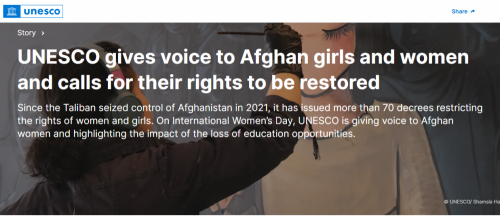
https://www.unesco.org/en/articles/unesco-gives-voice-afghan-girls-and-w...
“We have no right to education, no right to work, no right to even exist freely. They are removing us from society.” One woman in Afghanistan gives voice to what many Afghan women and girls are feeling: for them, life has become unbearable, limited to the four walls they live in.
Since the Taliban returned to power in 2021, education has been forbidden to girls aged over 12. As a result of this ban, Afghanistan is now the only country in the world where girls do not have the right to attend secondary school.
To date, these restrictions have affected around 1.5 million Afghan girls. According to new UNESCO data, if the ban continues until 2030, over 4 million girls will be affected.
Disturbingly, this regression follows decades of progress. After an ambitious international campaign coordinated by UNESCO, the number of girls enrolled in primary school rose from nearly zero in 2001 to 2.5 million in 2021. By this date, 30% of Afghan girls and women could also read and write – compared to just 17% two decades earlier.
Today, these advances are at an end, with the current restrictions wreaking disastrous consequences. Punitive salary cuts and irregular salary payments for female educators have led to a shortage of qualified teachers; a lack of equipment and facilities have taken their toll on education services. This decline in the quality of education has gone hand in hand with considerable learning losses.
Even more concerningly, the restrictions are taking a toll on women and girls’ mental health. According to Afghan journalist Diba Akbari, “If women were studying, schools and universities were closed to them. Work was closed to them. Today, these women are all prisoners and struggling with mental health problems.”
Alternative learning methods
In this bleak context, alternative learning methods have offered a glimmer of hope. For the past three and a half years, UNESCO has provided financial support and training to Afghan media outlets, enabling educational programmes to be broadcast to an estimated audience of 17 million Afghans.
We have established community-based literacy classes in several provinces, partnered with overseas universities offering online courses and supported educational programmes via radio and television.
One of these media outlets is Begum TV in Paris, along with its Kabul-based radio station, Radio Begum. Created by women for women, Radio Begum offers on-air-schooling, mental health support and financial literacy classes, reaching an audience of around 5.9 million – nearly two-thirds women – in 19 provinces.
However, in February 2025, Radio Begum was taken off air, after its offices were raided by Taliban officials. This closure caused widespread consternation, as one of Afghan women’s few remaining lifelines to the outside world was cut off. As underlined by one woman, “There is no more voice for us in Afghanistan.”










